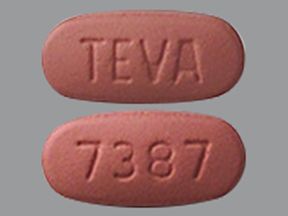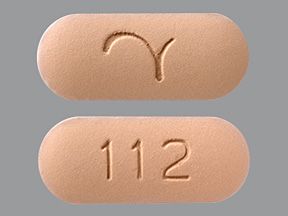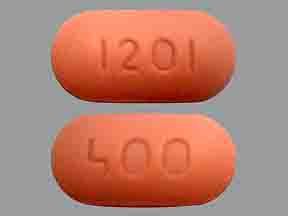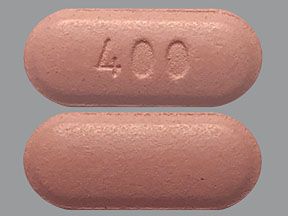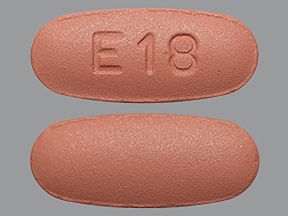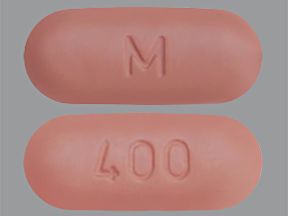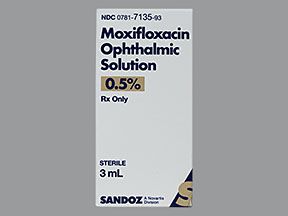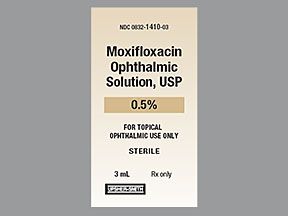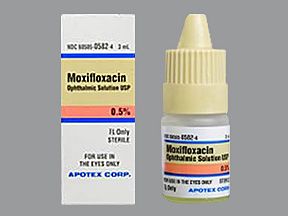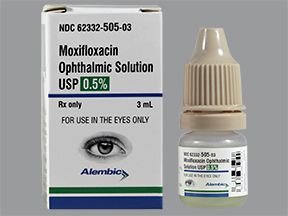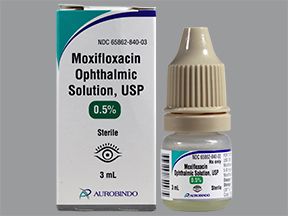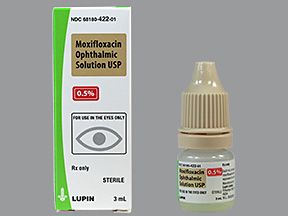This drug has boxed warnings. A boxed warning is the most serious warning from the Food and Drug Administration (FDA). It alerts doctors and patients about drug effects that may be dangerous.
- Tendon rupture warning: This drug can increase your risk of irritating or rupturing your tendons (the cords that attach your muscles to your bones). Your risk may be higher if you’re older than 60 years, take a corticosteroid drug, or have had a kidney, heart, or lung transplant.
- Muscle weakness warning: This drug can cause muscle weakness. If you have myasthenia gravis, this drug may make your muscle weakness worse. You should not take this medication if you have myasthenia gravis.
- Peripheral neuropathy warning: This drug may cause peripheral neuropathy (nerve damage). This condition causes changes in sensation and damage to the nerves in your arms, hands, legs, or feet. This damage may be permanent. Stop taking this drug and call your doctor right away if you have any signs of peripheral neuropathy in your arms, hands, legs, or feet. Symptoms include pain, burning, tingling, numbness, and weakness.
- Central nervous system effects warning: This drug raises your risk of central nervous system (CNS) effects. These can include convulsions, psychosis, and increased pressure inside your head. It can also cause tremors, anxiety, agitation, confusion, delirium, and hallucinations. In addition, it can cause paranoia, depression, nightmares, and trouble sleeping. Rarely, it can cause suicidal thoughts or acts. Be sure to tell your doctor if you’re at increased risk of seizures.
- Restricted use warning: This drug can cause serious side effects. As a result, it should only be used to treat certain conditions if no other treatment options exist. These conditions are acute bacterial exacerbation of chronic bronchitis and acute bacterial sinusitis.
- Moxifloxacin oral tablet is available as a brand-name drug and a generic drug. Brand name: Avelox.
- Moxifloxacin comes as a tablet you take by mouth and as an ophthalmic solution (eye drop). It’s also available as an intravenous (IV) drug, which is only given by a healthcare provider.
- Moxifloxacin oral tablet is used to treat bacterial infections. It won’t work to treat a viral infection, such as the common cold.
Moxifloxacin is a prescription drug. It comes as an oral tablet and an ophthalmic solution. It also comes as an intravenous (IV) drug, which is only given by a healthcare provider.
Moxifloxacin is available as the brand-name drug Avelox. It’s also available as a generic drug. Generic drugs usually cost less than the brand-name version. In some cases, they may not be available in every strength or form as the brand-name drug.
Why it’s used
Moxifloxacin is used to treat bacterial infections, including:
- sinus and lung infections
- community-acquired pneumonia
- skin infections
- stomach infections
- plague
How it works
Moxifloxacin belongs to a class of drugs called fluoroquinolones. A class of drugs is a group of medications that work in a similar way. These drugs are often used to treat similar conditions.
Moxifloxacin works by stopping a bacteria’s ability to copy their DNA. This action kills bacteria and stops them from reproducing. This treats your infection.
Moxifloxacin can cause mild or serious side effects. The following list contains some of the key side effects that may occur while taking moxifloxacin. This list does not include all possible side effects.
For more information on the possible side effects of moxifloxacin, or tips on how to deal with a troubling side effect, talk with your doctor or pharmacist.
More common side effects
The more common side effects of moxifloxacin include:
- nausea
- diarrhea
- headache
- vomiting
- dizziness
- nervousness
- agitation
- nightmares
If these effects are mild, they may go away within a few days or a couple of weeks. If they’re more severe or don’t go away, talk to your doctor or pharmacist.
Serious side effects
Call your doctor right away if you have serious side effects. Call 911 if your symptoms feel life-threatening or if you think you’re having a medical emergency. Serious side effects and their symptoms can include the following:
- Liver failure. Symptoms can include:
- yellowing of your skin or the whites of your eyes
- pain in the upper right part of your abdomen
- nausea and vomiting
- Stevens-Johnson syndrome. This is a serious, life-threatening skin rash. Symptoms can include:
- fever
- rash
- sores in or around your mouth, nose, eyes, or genitals
- peeling skin
- Kidney failure. Symptoms can include:
- making less urine than normal
- swelling of your feet, legs, and arms
- chest pain or pressure
- Seizures
- Peripheral neuropathy. Symptoms typically start in your hands and feet and spread to your arms and legs. Symptoms can include:
- tingling
- burning
- pain
- numbness
- weakness
- sensitivity to touch
- Severe diarrhea. These symptoms will last after you stop taking the drug. Symptoms can include:
- watery or bloody diarrhea
- stomach cramping
- fever
- loss of appetite
- nausea
- Heart rhythm problems such as torsades de pointes (irregular heart rhythm). This drug can change your heartbeat in a way that puts you at risk for a life-threatening, irregular heart rhythm. Symptoms can include:
- palpitations (feeling like your heart is skipping a beat)
- fast, irregular heartbeat
- dizziness
- fainting
- seizures
- Tendon rupture. Your Achilles tendon is the most likely to rupture. Symptoms of an Achilles tendon rupture can include:
- sudden, severe pain
- swelling
- redness and warmth around the area
- trouble walking
- not being able to stand on your tiptoes on the injured foot
- Joint and muscle pain
- Increased sensitivity to the sun that can lead to sunburn
Moxifloxacin oral tablet can interact with several other medications. Different interactions can cause different effects. For instance, some can interfere with how well a drug works, while others can cause increased side effects.
Below is a list of medications that can interact with moxifloxacin. This list does not contain all drugs that may interact with moxifloxacin.
Before taking moxifloxacin, be sure to tell your doctor and pharmacist about all prescription, over-the-counter, and other drugs you take. Also tell them about any vitamins, herbs, and supplements you use. Sharing this information can help you avoid potential interactions.
If you have questions about drug interactions that may affect you, ask your doctor or pharmacist.
Interactions that increase your risk of side effects
- Side effects from moxifloxacin. Taking moxifloxacin with certain medications raises your risk of side effects from moxifloxacin. Examples of these drugs include:
- Corticosteroids, such as prednisone and dexamethasone. Using these drugs with moxifloxacin can increase your risk of tendon rupture.
- Antipsychotic drugs, such as chlorpromazine, haloperidol, and ziprasidone. Using these drugs with moxifloxacin can increase your risk of a life-threatening, irregular heart rhythm called torsades de pointes.
- Side effects from other drugs: Taking moxifloxacin with certain medications raises your risk of side effects from these drugs. Examples of these drugs include:
- Nonsteroidal anti-inflammatory drugs (NSAIDs), such as ibuprofen, naproxen, and diclofenac. Taking moxifloxacin with NSAIDs can increase your risk of convulsions (violent, involuntary movements).
- Heart rhythm drugs, such as sotalol, amiodarone, and dofetilide. Taking moxifloxacin with these drugs can increase your risk of heart rate problems, including torsades de pointes. This is a life-threatening, irregular heart rhythm.
- Warfarin. Moxifloxacin can increase the amount of warfarin in your body. This can cause side effects, such as bleeding.
- Drugs used to treat diabetes, such as glyburide. Taking moxifloxacin with drugs used to treat diabetes may results in high or low blood sugar levels. Your doctor will monitor your blood sugar levels closely if you take one of these drugs with moxifloxacin.
Interactions that can make your drugs less effective
When moxifloxacin is used with certain drugs, it may not work as well to treat your condition. This is because the amount of moxifloxacin in your body may be decreased. Examples of these drugs include:
- Antacids, sucralfate, didanosine, multivitamins, and iron, zinc, or magnesium supplements. You should take moxifloxacin at least four hours before taking these drugs or eight hours after taking these drugs.
The moxifloxacin dosage your doctor prescribes will depend on several factors. These include:
- the type and severity of the condition you’re using moxifloxacin to treat
- your age
Typically, your doctor will start you on a low dosage and adjust it over time to reach the dosage that’s right for you. They’ll ultimately prescribe the smallest dosage that provides the desired effect.
The following information describes dosages that are commonly used or recommended. However, be sure to take the dosage your doctor prescribes for you. Your doctor will determine the best dosage to suit your needs.
Drug forms and strengths
Generic: Moxifloxacin
- Form: oral tablet
- Strengths: 400 mg
Brand: Avelox
- Form: oral tablet
- Strengths: 400 mg
Dosage for sinus and lung infections
Adult dosage (ages 18 years and older)
- Typical starting dosage: One 400-mg tablet taken once per day.
- Length of treatment: Typically 5 to 14 days, depending on the condition being treated.
Child dosage (ages 0–17 years)
It hasn’t been confirmed that this drug is safe and effective for use in children younger than 18 years.
Dosage for community-acquired pneumonia
Adult dosage (ages 18 years and older)
- Typical starting dosage: One 400-mg tablet taken once per day.
- Length of treatment: Typically 7 to 14 days.
Child dosage (ages 0–17 years)
It hasn’t been confirmed that this drug is safe and effective for use in children younger than 18 years.
Dosage for skin infections
Adult dosage (ages 18 years and older)
- Typical starting dosage: One 400-mg tablet taken once per day.
- Length of treatment: Typically 7 to 21 days, depending on the condition being treated.
Child dosage (ages 0–17 years)
It hasn’t been confirmed that this drug is safe and effective for use in people children than 18 years.
Dosage for stomach infections
Adult dosage (ages 18 years and older)
- Typical starting dosage: One 400-mg tablet taken once per day.
- Length of treatment: Typically 5 to 14 days.
Child dosage (ages 0–17 years)
It hasn’t been confirmed that this drug is safe and effective for use in children younger than 18 years.
Dosage for plague
Adult dosage (ages 18 years and older)
- Typical starting dosage: One 400-mg tablet taken once per day.
- Length of treatment: Typically 10 to 14 days.
Child dosage (ages 0–17 years)
It hasn’t been confirmed that this drug is safe and effective for use in children younger than 18 years.
FDA warnings
- This drug has black box warnings. These are the most serious warnings from the Food and Drug Administration (FDA). Black box warnings alert doctors and patients about drug effects that may be dangerous.
- Tendon rupture warning: This drug can increase your risk of irritating or rupturing your tendons (the cords that attach your muscles to your bones). Your risk may be higher if you’re older than 60 years, take a corticosteroid drug, or have had a kidney, heart, or lung transplant.
- Muscle weakness warning: This drug can cause muscle weakness. If you have myasthenia gravis, this drug may make your muscle weakness worse. You should not take this medication if you have myasthenia gravis.
- Peripheral neuropathy warning: This drug may cause peripheral neuropathy (nerve damage). This condition causes changes in sensation and damage to the nerves in your arms, hands, legs, or feet. This damage may be permanent. Stop taking this drug and call your doctor right away if you have any signs of peripheral neuropathy in your arms, hands, legs, or feet. Symptoms include pain, burning, tingling, numbness, and weakness.
- Central nervous system effects warning: This drug raises your risk of central nervous system (CNS) effects. These can include convulsions, psychosis, and increased pressure inside your head. It can also cause tremors, anxiety, agitation, confusion, delirium, and hallucinations. In addition, it can cause paranoia, depression, nightmares, and trouble sleeping. Rarely, it can cause suicidal thoughts or acts. Be sure to tell your doctor if you’re at increased risk of seizures.
- Restricted use warning: This drug can cause serious side effects. As a result, it should only be used to treat certain conditions if no other treatment options exist. These conditions are acute bacterial exacerbation of chronic bronchitis and acute bacterial sinusitis.
Diarrhea warning
This drug may cause diarrhea. Symptoms can include frequent bloody or watery diarrhea, stomach cramps, fever, and loss of appetite. Call your doctor if these symptoms are severe or if they continue after you stop taking this drug.
Medication completion warning
You must finish the entire course of treatment of this drug as prescribed by your doctor. Do not stop taking the drug or skip doses, even if you start to feel better.
Not finishing your course of treatment could cause your infection to last longer. You could also develop a resistance to the medication. This means that if you get a bacterial infection again, moxifloxacin may not work to treat it.
Allergy warning
Moxifloxacin can cause a severe allergic reaction. Symptoms can include:
- trouble breathing
- loss of consciousness (blacking out)
- swelling of your mouth, tongue, or throat
- hives
- rash
- sores in or around your mouth, nose, eyes, or genitals
- peeling skin
If you develop these symptoms, call 911 or go to the nearest emergency room.
Don’t take this drug again if you’ve ever had an allergic reaction to it. Taking it again could be fatal (cause death).
Warnings for people with certain health conditions
For people with heart conditions: This drug can change your heart rhythm. If you have QT prolongation, you shouldn’t take this medication.
For people with diabetes: People who take moxifloxacin with diabetes drugs or insulin can develop low blood sugar (hypoglycemia) or high blood sugar (hyperglycemia). Severe problems, such as coma and death, have been reported as a result of hypoglycemia.
Test your blood sugar as often as your doctor recommends. If you have low blood sugar levels while taking this drug, stop taking it and call your doctor right away. Your doctor may need to change your antibiotic.
For people with myasthenia gravis: This drug may make your muscle weakness worse. You shouldn’t take this medication.
For people with seizures: This drug can cause seizures. If you have a history of seizures, ask your doctor if this drug is safe for you.
For people with liver problems: If you have a history of liver problems, you’re at higher risk of a life-threatening, irregular heart rhythm called torsades de pointes. Your doctor will monitor you more closely during your treatment with this drug.
Warnings for other groups
For pregnant women: Moxifloxacin is a category C pregnancy drug. That means two things:
- Research in animals has shown adverse effects to the fetus when the mother takes the drug.
- There haven’t been enough studies done in humans to be certain how the drug might affect the fetus.
Talk to your doctor if you’re pregnant or planning to become pregnant. This drug should be used only if the potential benefit justifies the potential risk.
If you become pregnant while taking this drug, call your doctor right away.
For women who are breastfeeding: Moxifloxacin may pass into breast milk and may cause side effects in a child who is breastfed. Talk to your doctor if you breastfeed your child. You may need to decide whether to stop breastfeeding or stop taking this medication.
For seniors: If you’re older than 65 years, you may be at higher risk of heart rhythm problems and tendon rupture. If you have diabetes, you may also have a higher risk for blood sugar changes.
For children: This medication hasn’t been studied in children. It shouldn’t be used in children younger than 18 years.
Moxifloxacin oral tablet is used for short-term treatment. It comes with risks if you don’t take it as prescribed.
If you stop taking the drug or don’t take it at all: Your infection may not get better or may get worse. You must finish the entire course of treatment as prescribed by your doctor. Don’t stop taking it or skip doses if you start to feel better. Doing so could cause your infection to last longer. You could also develop a resistance to the medication. This means that if you get a bacterial infection again, this drug may not work to treat it.
If you miss doses or don’t take the drug on schedule: Your medication may not work as well or may stop working completely. For this drug to work well, a certain amount needs to be in your body at all times.
If you take too much: You could have dangerous levels of the drug in your body. Symptoms of an overdose of this drug can include:
- vomiting
- dizziness
- agitation
- seizures
- irregular heart rhythm
If you think you’ve taken too much of this drug, call your doctor or seek guidance from the American Association of Poison Control Centers at 800-222-1222 or through their online tool. But if your symptoms are severe, call 911 or go to the nearest emergency room right away.
What to do if you miss a dose: Take your dose as soon as you remember. But if you remember just a few hours before your next scheduled dose, take only one dose. Never try to catch up by taking two doses at once. This could result in dangerous side effects.
How to tell if the drug is working: The symptoms of your infection should get better.
Keep these considerations in mind if your doctor prescribes moxifloxacin for you.
General
- You can take this drug with or without food. Taking it with food may help to reduce upset stomach.
- Take this drug at the time(s) recommended by your doctor.
- Don’t cut or crush the tablet.
Storage
- Store moxifloxacin at room temperature between 59°F and 86°F (15°C and 30°C).
- Keep this drug away from light.
- Don’t store this medication in moist or damp areas, such as bathrooms.
Refills
A prescription for this medication is refillable. You should not need a new prescription for this medication to be refilled. Your doctor will write the number of refills authorized on your prescription.
Travel
When traveling with your medication:
- Always carry your medication with you. When flying, never put it into a checked bag. Keep it in your carry-on bag.
- Don’t worry about airport X-ray machines. They can’t harm your medication.
- You may need to show airport staff the pharmacy label for your medication. Always carry the original prescription-labeled container with you.
- Don’t put this medication in your car’s glove compartment or leave it in the car. Be sure to avoid doing this when the weather is very hot or very cold.
Clinical monitoring
You and your doctor should monitor certain health issues. This can help make sure you stay safe while you take this drug. These issues include:
- Blood sugar levels. You doctor will monitor your blood sugar levels if you have diabetes.
- International normalized ratio (INR). If you take warfarin, your doctor will check your INR and prothrombin time.
- Heart rhythm. If you have liver problems or are at high risk for an irregular heart rhythm, you doctor will check your heart rhythm.
Your diet
Drink plenty of water. While you’re taking this drug, you should stay well hydrated.
Sun sensitivity
This drug can make your skin more sensitive to the sun. This increases your risk of sunburn. Avoid being in the sun if you can. If you must be outside, wear protective clothing and sunscreen.
There are other drugs available to treat your condition. Some may be better suited for you than others. Talk to your doctor about other drug options that may work for you.
Disclaimer: Healthline has made every effort to make certain that all information is factually correct, comprehensive, and up-to-date. However, this article should not be used as a substitute for the knowledge and expertise of a licensed healthcare professional. You should always consult your doctor or other healthcare professional before taking any medication. The drug information contained herein is subject to change and is not intended to cover all possible uses, directions, precautions, warnings, drug interactions, allergic reactions, or adverse effects. The absence of warnings or other information for a given drug does not indicate that the drug or drug combination is safe, effective, or appropriate for all patients or all specific uses.

